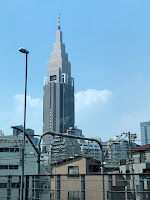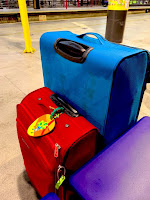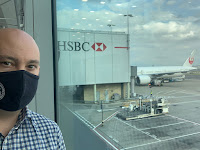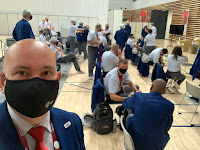As you can imagine, the last few days have been pretty hectic with travelling to Japan, initial referee meetings and all of the other things that we've needed to do to prepare ahead of the Games.
I'm writing this on the morning after the Opening Ceremony, so the GAMES ARE OFFICALLY OPEN!
There is lots to cover between last Saturday and today (Wednesday) - where on Earth did all that time go!?!?
Prepare for lots of subheadings and even more photographs in this update!
The journey to Tokyo
In a nutshell, my journey began at 6.30am on Saturday morning, leaving home for Leeds train station to catch a train to Manchester Airport. At the point of booking the train, it was cheaper to buy a seat in First Class than it was in standard class, so who was I to argue?
The flight from Manchester to London Heathrow was uneventful, other than the lady at check in trying to tell me I had the wrong documentation to get into Japan... However after speaking with a supervisor, I was quickly sent through to airside where I grabbed some breakfast (and got the obligatory photograph with the giraffe outside the Giraffe restaurant!)
When I arrived at Heathrow, I transferred from T5 to T3 and headed to the Japan Airlines desk to get my boarding card for the next leg. Before I even opened my mouth, I was greeted with 'Good morning, Mr Wood. I've been expecting you...' I FELT LIKE JAMES BOND! 😂 We discussed seating options and I was moved to a row without any other passengers. 'You'll want to stretch out and get some sleep, I'm sure, Mr Wood. It IS an 11 hour flight, after all.'
Still feeling like a wannabe secret agent, I found my way to the No.1 Lounge. A friend from work knew someone who worked at the airport and managed to organise complimentary access for me, since I had a 6 hour wait before boarding my flight to Japan. (Thanks Parie!) There were only a handful of other passengers in, so I managed to use the time to do some school work ahead of reopening in September, make some phone calls to family and avail myself of the complimentary food and drink, even if there WAS coriander on the vegetable curry! (Not a big fan of that particular herb...) The flight left on time, and probably only had 50 passengers (of a capacity of 350+!) The level of service was outstanding, with each of the flight attendants in my zone introducing themselves personally to each passenger.
After a few hour's sleep, some tasty food and listening to some relaxing Japanese music, we touched down in Tokyo and I prepared myself for the 3-4 wait we had been warned about. Documentation checks, PCR testing, accreditation activation, immigration and customs lay in wait for me, but first I had to get off the plane! Disembarkation was VERY smooth. All Tokyo 2020 delegates were told to remain in their seats until everyone else had left, since there were separate processes for our group of passengers compared with Japanese nationals and residents.
Following the signs, and a HUGE number of happy, smiling volunteers, my first impressions of Japan were ones of organisation, respect and safety. All of my documentation was checked meticulously, the pre-installed apps on my phone activated and I then went for the first of the 16 PCR tests I will do do whilst here. Thankfully, each of the PCR tests are saliva-based and not nasal insertion or throat swabs!
Each passenger received a document with a PCR test number on it. After the test, I was sent to a holding area to wait for the result. I needed to watch the screen you see in the image below for my PCR number. Once it flashed up, I could head on to immigration and customs but I'd been told it was currently a 2 hour wait. I sat and started to read a book, when suddenly a huge cheer and round of applause erupted around me. Thinking a famous Paralympian or celebrity had arrived, I looked up in anticipation to simply see a passenger stand and leave the waiting area - their PCR number had appeared on the screen and their travel companions decided to give them a send off. It became a bit of a game over the next half hour, until my number flashed up and I made a quick (and quiet) exit.
It quickly struck me how clean everything was and how polite everyone was. I must have been bowed to at least 20 times as I moved through the airport, each of which I responded to with the same gesture, and also managed to use a little bit of broken Japanese to say 'hello' and 'thank you very much' at appropriate times.
In total, it took me just over an hour to get from the plane to meeting the transport representative in Arrivals who organised my transfer from the airport to the hotel. I had made it onto Japanese soil. I was finally here - 365 days later than planned, but I was here. And boy was it hot and humid!
Tokyo 2020 Kit Collection
 After dropping my bags quickly at the hotel, it was straight off to another place to collect our official Tokyo 2020 ITO kit. It was also an opportunity to catch a glimpse of some of the Tokyo skyline, since we travelled into the middle of the city.
After dropping my bags quickly at the hotel, it was straight off to another place to collect our official Tokyo 2020 ITO kit. It was also an opportunity to catch a glimpse of some of the Tokyo skyline, since we travelled into the middle of the city.

Arriving at the uniform centre, we were met by a very organised system, similar to a production line. A number of tailors were on hand to help with the process (think 'Suits you, sir' from The Fast Show - Google it!) and within an hour, we had collected our casual and formal uniforms. Yet again the atmosphere throughout the process was one of positivity, organisation and respect - and completely different to the kit collection procedures from Rio (which employed a similar production line system, but in the basement of one of the Village apartment complexes)

By the time we'd all finished it was dark outside. The Tokyo skyline was breath-taking, especially when we approached the Rainbow Bridge with the full moon sitting proudly above it.


There won't be much opportunity to wear this kit though, because we are essentially confined to the hotel or the arena for Covid safety reasons. We even have to travel to and from the arenas in our referee kit because the changing rooms are closed!
Referee Preparation
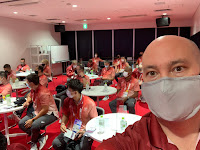 Many of us haven't refereed competitive basketball in more than a year, so the preparation meetings for this year's Games have been even more important. We have covered points of emphasis for the tournament, toured the arenas, had practical sessions to recap correct refereeing mechanics (positioning) and also some training on mental preparation from a sports psychologist.
Many of us haven't refereed competitive basketball in more than a year, so the preparation meetings for this year's Games have been even more important. We have covered points of emphasis for the tournament, toured the arenas, had practical sessions to recap correct refereeing mechanics (positioning) and also some training on mental preparation from a sports psychologist.
Words can't actually describe the feeling you get as you walk into a Paralympic venue for the first time. I will always remember the first time I walked into the arena in Rio - I was hit with such a wall of unexpected emotion it took all the strength I had not to burst into tears of happiness and pride. That experience 5 years ago prepared me well for this one, but walking into the Ariake Arena for the first time still took my breath away. I'm not sure if arenas can be called beautiful, but this one comes very close. There is wood EVERYWHERE, adding such a beautiful aesthetic to the interior. I'm also pretty sure the sound quality would be amazing if fans had been allowed in to watch.
Once we got back to the hotel, there was time for a quick dinner (in my room) before being interviewed on the radio about my refereeing journey, the basics of wheelchair basketball and what people should look for when watching the games on TV. The interview was live and I was so nervous! (But not nervous enough to quickly wish my wife a happy 13th anniversary and a cheeky hi to my two boys!) 😇



Official Photographs & Referee Uniform Collection
From our casual uniform on one day to our formal uniform the next for the official ITO photographs of the Tokyo 2020 Paralympic Games.

Of the many things I have learned over the years of international officiating is that at big events there can be a lot of waiting around. I enjoy this aspect of tournaments though, because I like to watch people. Don't get me wrong, I really enjoy the social aspect of waiting - it is a perfect opportunity to catch up with friends and colleagues (and since we are confined to our rooms in the hotel, these are the only 'social' times we are currently allowed). But I also like to take a moment to myself, to sit and watch others interact. I find it fascinating to watch people's body language and listen to spoken intonation, especially since there are noticeable differences depending on where you are from. I use this as an opportunity to refine my communication and personal interaction skills, to use both on the basketball court but also when working at school with pupils and parents.
 We also picked up our referee uniforms at this session, consisting of 2 referee shirts, a jacket, 3 pairs of socks, 3 IWBF-branded face masks, a back pack and a whistle. We were told to bring our own trousers, but had to remove all branding on them (since Nike is the primary sponsor for us at this Games, as opposed to Champion at many previous games). New kit is always exciting, whether it is Tokyo casual, formal or for refereeing. It provides a tangible memory from the event, and is only provided to a very small, select group.
We also picked up our referee uniforms at this session, consisting of 2 referee shirts, a jacket, 3 pairs of socks, 3 IWBF-branded face masks, a back pack and a whistle. We were told to bring our own trousers, but had to remove all branding on them (since Nike is the primary sponsor for us at this Games, as opposed to Champion at many previous games). New kit is always exciting, whether it is Tokyo casual, formal or for refereeing. It provides a tangible memory from the event, and is only provided to a very small, select group. As we were told at the start of the very first meeting:
"Congratulations. You are all here because you are the very best 24 officials in the world."
That kinda focuses the mind a little bit, don't you think?
Game On!
The Games officially opened last night, with a spectacular opening ceremony. Listening to the commentary in Japanese was interesting, but was particularly impressive to see the amount of diversity reflected in the ceremony, including LGBTQ+. I think the use of rainbows throughout the ceremony (in particular the fireworks that went off from the roof of the stadium for all in Tokyo to see) was a fantastic touch.
There was a time not too long ago where I was questioning whether I should still attend these Games, and some colleagues from all around the world have said similar.
Now that I'm here, there is no place I'd rather be.*




















